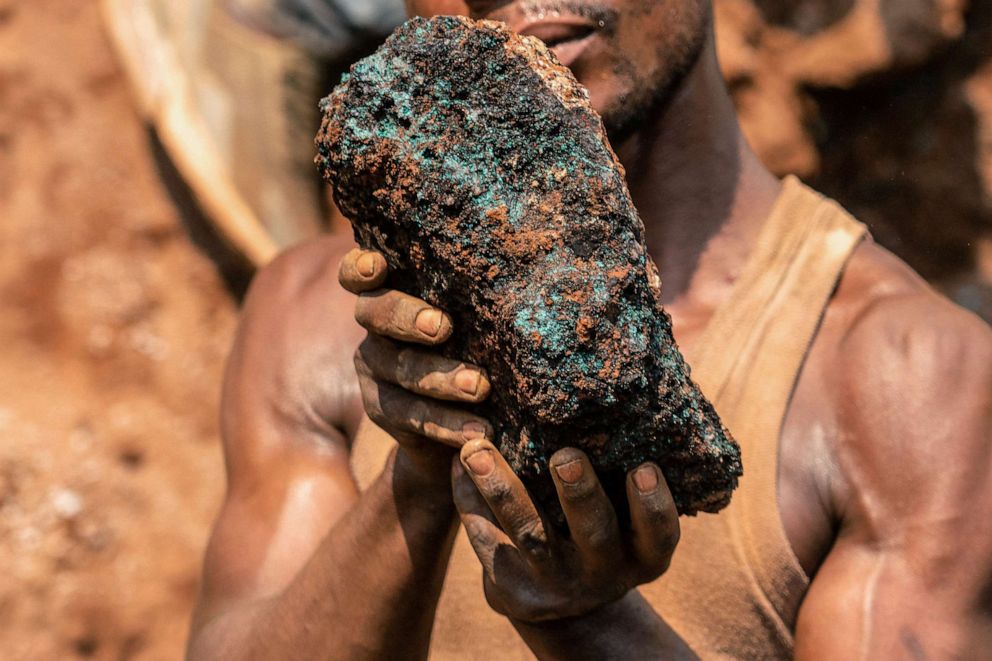Congo's Cobalt Export Ban: Impact On The Global Market And The Awaiting Quota Plan

Table of Contents
The Current State of Cobalt Mining in the DRC
The DRC's cobalt mining sector is a complex and multifaceted landscape, presenting both significant opportunities and considerable challenges.
Challenges Facing the Congolese Mining Sector:
The cobalt supply chain in the DRC is plagued by several persistent issues:
- Lack of transparency and traceability: The complex network of artisanal and industrial mining operations makes it difficult to track cobalt from mine to market, hindering efforts to ensure ethical and sustainable practices. This lack of transparency fuels concerns about human rights abuses and environmental damage.
- Environmental concerns related to artisanal mining practices: Artisanal miners often employ environmentally destructive methods, leading to deforestation, soil erosion, and water pollution. This poses significant long-term risks to the environment and the health of local communities.
- Human rights violations associated with cobalt mining: Reports of child labor and unsafe working conditions in artisanal mines are widespread, raising serious ethical concerns about the human cost of cobalt production. International pressure is mounting to address these issues.
- Limited value addition within the DRC: Most cobalt is exported as raw material, limiting the economic benefits for the DRC. Processing and refining cobalt domestically could significantly boost the country's GDP and create more jobs.
Dependence on Cobalt Exports for the DRC's Economy:
Cobalt exports represent a substantial source of revenue for the Congolese government, but this dependence creates vulnerabilities:
-
Cobalt as a significant source of revenue for the Congolese government: Fluctuations in global cobalt prices directly impact government revenue and the overall economic stability of the DRC.
-
The vulnerability of the economy to fluctuations in global cobalt prices: The DRC's economy is highly susceptible to volatile cobalt market conditions, making diversification essential for long-term stability.
-
The need for diversification of the DRC's economic base: Reducing reliance on cobalt exports is crucial for building a more resilient and sustainable economy.
-
Major Cobalt Mining Companies: Glencore, Eurasian Resources Group (ERG), and several other multinational companies operate large-scale cobalt mines in the DRC, contributing significantly to global cobalt supply. However, a substantial portion of cobalt production comes from artisanal miners.
-
Artisanal vs. Industrial Mining: Estimates suggest that artisanal mining accounts for a significant percentage (varying estimates exist) of cobalt production in the DRC, highlighting the need for improved regulation and support for these miners.
Potential Impact of a Cobalt Export Ban on the Global Market
A Congolese cobalt export ban would have far-reaching consequences for the global market:
Disruption to the Electric Vehicle Industry:
The impact on the electric vehicle (EV) industry would be particularly severe:
- Increased prices for electric vehicle batteries: Reduced cobalt supply would inevitably lead to higher prices for battery components, impacting the affordability and competitiveness of EVs.
- Potential delays in the production and rollout of electric vehicles: Manufacturers might face production delays or be forced to scale back EV production due to cobalt shortages.
- Impact on the global transition to sustainable transportation: The higher cost and potential supply constraints of EVs could slow down the global shift towards sustainable transportation.
Impact on Other Industries:
Cobalt is used in various applications beyond electric vehicles:
-
Cobalt's role in various technological applications beyond electric vehicles: Industries such as aerospace, medical devices, and high-strength alloys also rely heavily on cobalt.
-
The ripple effect of cobalt price increases across various sectors: Cobalt price increases would impact these sectors, potentially triggering further price increases and supply chain disruptions.
-
Increased demand for alternative materials and technologies: The cobalt shortage would accelerate the search for alternative materials and technologies to replace cobalt in various applications.
-
Potential Price Increases: Experts predict substantial price increases, potentially several-fold, depending on the duration of the ban and the effectiveness of finding alternative sources.
-
Cobalt Substitutes: Research into alternative battery technologies and materials is ongoing, but finding suitable and readily scalable substitutes for cobalt in all applications will take time.
The Proposed Cobalt Quota System: A Solution or Further Problem?
The proposed cobalt quota system aims to address some of the challenges facing the DRC's cobalt sector, but it also presents potential drawbacks:
Advantages of a Quota System:
A well-designed quota system could offer several benefits:
- Potential for increased government revenue through export taxes: The DRC could generate significantly more revenue by taxing cobalt exports, supporting its economic development.
- Opportunities for local value addition and processing of cobalt within the DRC: Quotas could incentivize the development of domestic cobalt processing facilities, creating jobs and increasing the country's economic benefits.
- Improved control over the cobalt supply chain, addressing environmental and human rights concerns: A properly managed quota system could improve traceability and accountability, facilitating efforts to address environmental and human rights issues.
Challenges of Implementing a Quota System:
However, implementing a successful quota system faces significant hurdles:
-
Difficulties in monitoring and enforcement of quotas: Monitoring and enforcing quotas will be challenging given the complex structure of the cobalt industry in the DRC.
-
Potential for corruption and illicit trade: The risk of corruption and illegal cobalt trading is high, undermining the effectiveness of the quota system.
-
Concerns about the fairness and transparency of quota allocation: A transparent and equitable allocation system is essential to avoid exacerbating existing inequalities among miners.
-
Quota Allocation Mechanisms: The DRC government needs to establish clear and transparent criteria for allocating quotas, ensuring fair representation for both large-scale mining companies and artisanal miners.
-
Historical Effectiveness: Similar quota systems in other resource-rich nations have had mixed results, with many facing challenges related to implementation and enforcement.
Conclusion: Navigating the Complexities of Congo's Cobalt Policy
Congo's potential cobalt export ban or the implementation of a quota system presents a complex situation with significant implications for the global market and the DRC itself. While aiming to increase government revenue and address ethical concerns, these measures risk disrupting supply chains and driving up cobalt prices, potentially hindering the growth of the electric vehicle industry and other sectors reliant on this crucial metal. The success of any quota system hinges on its transparency, effective implementation, and the commitment to tackling the environmental and social challenges inherent in cobalt mining.
Call to Action: Stay informed about the evolving situation regarding Congo's cobalt export policy. Understanding the complexities surrounding the Congo cobalt export ban and the proposed quota system is critical for businesses, investors, and policymakers alike. Follow further developments regarding the Congo cobalt export ban and quota plan to mitigate potential risks and capitalize on emerging opportunities. The future of cobalt, and the DRC's role in its supply, remains uncertain, making continuous monitoring crucial.

Featured Posts
-
 The Truth About Us Canada Trade Debunking Trumps Claims
May 15, 2025
The Truth About Us Canada Trade Debunking Trumps Claims
May 15, 2025 -
 La Lakers Roster Schedule And News Vavel United States
May 15, 2025
La Lakers Roster Schedule And News Vavel United States
May 15, 2025 -
 Action Bronson Responds To Jaylen Browns Luke Combs Mix Up
May 15, 2025
Action Bronson Responds To Jaylen Browns Luke Combs Mix Up
May 15, 2025 -
 Padres Vs Opponent Pregame Analysis Arraez Heyward Key To Victory
May 15, 2025
Padres Vs Opponent Pregame Analysis Arraez Heyward Key To Victory
May 15, 2025 -
 Paddy Pimblett Ufc 314 Champion Goat Legends Backing Fuels Prediction
May 15, 2025
Paddy Pimblett Ufc 314 Champion Goat Legends Backing Fuels Prediction
May 15, 2025
